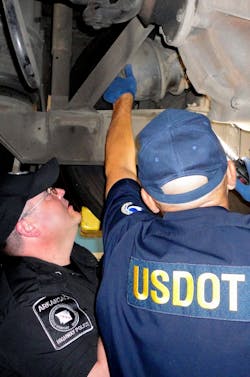A looming government shutdown, a massive tax cut, a renewed effort to repeal and replace Obamacare, the Wall: The Trump Administration and Congress have big, big plans to work through this week—but activity is not achievement. And lost in all the political posturing is a much-needed bureaucratic correction that, if not addressed, could undo hard-won truck safety gains.
It seems that somewhere along the way the federal funding for state commercial vehicle enforcement programs took a wrong turn, an accounting detour, a procedural side street. No big deal, in the grand scheme of things—except, says an enforcement organization leader, highway safety will suffer if Congress doesn’t get its act together. And that makes this accounting/parliamentary issue important.
Here’s the undone deal, as explained to me by Collin Mooney, executive director of the Commercial Vehicle Safety Alliance: Some state trucking programs were previously funded by the feds in some byzantine way or other, but the more efficient highway bill, the FAST Act, consolidated and simplified. Rah, say the trucking industry and their enforcement frenemies. Let’s move on.
But then, you know, something came up—or, rather, nothing. As in, Congress didn’t pass a DOT budget to implement the FAST Act programs. Instead, the 2016 funding levels have been carried into this year, and the current continuing resolution (CR) was drafted using the pre-FAST Act funding model.
Because the CR was not updated to reflect the new grant structure, the DOT budget inadvertently funds several grants that no longer exist while failing to fully fund the MCSAP formula grant and the revamped High Priority grant programs, according to CVSA. This means, although Congress has already allocated the money, if the issue is left unresolved FMCSA will not be able to disburse nearly $112 million in fiscal 2017 funds to the states. As a result, not only are states not receiving the full funding level authorized in the FAST Act for fiscal 2017, but they could, in fact, receive less in fiscal 2017 than they did in fiscal 2016.
You want more irony? If the CR is extended without change because the Trump administration insists on having money for the wall with Mexico in the new budget, FMCSA will not be able to disburse funds under the Border Enforcement Grants Program (BEG)—the program that ensures foreign carriers coming into the United States are compliant with the U.S. safety regulations.
The more subtle impact, CVSA’s Mooney contends, is that states must make adjustments to deal with not having the federal funding they were promised under the FAST Act. That typically means re-budgeting and reassigning personnel and other resources—fewer inspections, compliance reviews, safety audits and education programs, to say nothing of jobs.
The immediate solution is an “anomaly request,” a not uncommon procedure that will move money that has already been appropriated into the correct account for FMCSA to distribute. CVSA also would like to see funding boosted to match the Fast Act levels.
“We’re more than halfway through the fiscal year, operating on 2016 monies, waiting for the new administration to get into place—but that part of it is not really unusual, it’s the nature of the beast,” Mooney says. “However, if our anomaly request is not acted on, it’s a $112 million shortfall for state commercial vehicle enforcement. That’s one-third of MCSAP dollars. Those monies are currently being spent in many states on the assumption that money is there. This is our last window.”
Asked if the correction was a matter of truck safety on the highways, Mooney didn’t hesitate: “Yes, absolutely.”
Breakage, leakage, rounding error—the private sector has all sorts of names for the money-losing inefficiencies that are part of the cost of doing business. But nomenclature aside, in business any loss of revenue is a percentage point to be remedied, immediately. For the U.S. government, not so much. Of course, a rounding error at the federal level could fund a third world country (or a secret alien research lab), to say nothing of critical domestic programs. But Washington doesn’t think that way.
And, speaking of: I contacted FMCSA to verify the CVSA funding concerns, but because civil servants are forbidden by law from lobbying—or even appearing to lobby—Congress, no one could comment. Political appointees are free to be political, of course—except those top leadership positions at FMCSA remained unfilled.
More to come.
About the Author
Kevin Jones
Editor
Kevin has served as editor-in-chief of Trailer/Body Builders magazine since 2017—just the third editor in the magazine’s 60 years. He is also editorial director for Endeavor Business Media’s Commercial Vehicle group, which includes FleetOwner, Bulk Transporter, Refrigerated Transporter, American Trucker, and Fleet Maintenance magazines and websites.
Working from Beaufort, S.C., Kevin has covered trucking and manufacturing for nearly 20 years. His writing and commentary about the trucking industry and, previously, business and government, has been recognized with numerous state, regional, and national journalism awards.


